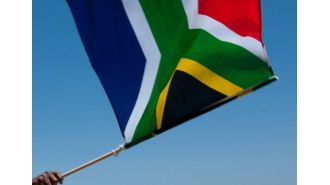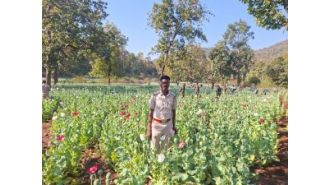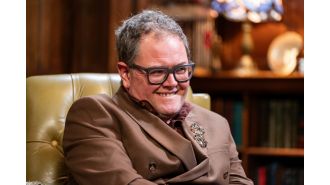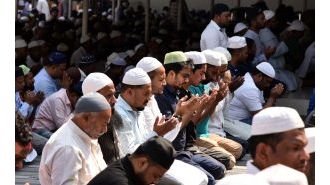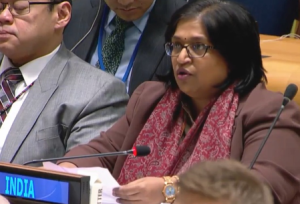Biden apologizes to Indigenous communities for 150-year boarding school policy during visit to Indian Country.
Biden passionately condemned the treatment of Native Americans during a visit to Arizona.

On a sunny Friday afternoon, President Joe Biden arrived at the Gila River Indian Community's land in Laveen Village, Arizona. This was his first visit to Indian Country as the President of the United States. The purpose of his visit was to formally apologize to Native Americans for the government's actions in running boarding schools for children. These schools, which forcibly separated children from their parents, have been a "blot on American history" for decades.
With a voice full of anger and emotion, Biden acknowledged the harm and suffering caused by the federal government's policies towards Native American children. He expressed his frustration that it had taken 50 years for an apology to be made. It was a moment of both contrition and frustration as the President sought to recognize one of the "most horrific chapters" in the history of the nation.
Biden spoke about the abuses and deaths that occurred in these boarding schools and emphasized the importance of acknowledging the truth, even if it is uncomfortable. He acknowledged the darkness of the past and stated that great nations must acknowledge both the good and the bad.
"As the President of the United States of America, I formally apologize for what we did," Biden declared. He recognized that the government's actions in removing children from their Native American communities and forcing them to attend boarding schools was a "significant mark of shame" and a "blot on American history." He also acknowledged that this part of history was not widely known or taught in schools.
Biden had promised tribal leaders nearly two years ago that he would visit Indian Country, and he fulfilled that promise. Heather Shotton, a descendant of Indian boarding school survivors and the vice president of diversity affairs at Fort Lewis College, expressed her hope that the apology would be accompanied by continued investment and a clear plan to address the intergenerational impacts of boarding schools on tribal communities.
Fort Lewis College, which once served as a Native American boarding school, now serves a large Indigenous population. Last year, History Colorado released a report that found at least 65 children had died at the Fort Lewis and Grand Junction Indian boarding schools in Colorado.
Shotton, a citizen of the Wichita and Affiliated Tribes and a Kiowa and Cheyenne descendant, was moved by Biden's acknowledgment of the intergenerational harm and the resilience of Indigenous people. She stated that despite the harm inflicted by the boarding schools, Native Americans have contributed greatly to the history and continue to do so.
The federal boarding schools were used to assimilate Native American children into white society, according to the White House. However, not everyone saw the apology as sufficient. Chase Iron Eyes, the director of the Lakota People's Law Project and Sacred Defense Fund, stated that while an apology is a good start, it is not enough to make up for the long history of colonial violence.
An Interior Department investigation found that at least 973 Native American children died in the U.S. government's abusive boarding school system over a 150-year period that ended in 1969. At least 18,000 children, some as young as 4 years old, were taken from their parents and forced to attend these schools.
Ramona Charette Klein, a boarding school survivor and an enrolled member of the Turtle Mountain Band of Chippewa, stated that while an apology is a step in the right direction, more needs to be done. She expressed hope that the momentum created by Biden's apology would continue.
The Democrats have been making efforts to reach out to Native American communities. Vice President Kamala Harris and her running mate, Minnesota Governor Tim Walz, have recently met with tribal leaders in Arizona and Nevada. Last week, former Secretary of State Hillary Clinton also met with the chairman of the Lumbee Tribe in North Carolina.
The Democratic National Committee has launched a campaign to target Native American voters in Arizona, North Carolina, Montana, and Alaska through various forms of media. Democratic Representative Ruben Gallego, who is running for Arizona's open Senate seat, has visited all 22 of Arizona's federally recognized tribes.
Harris, who started a recent campaign rally near the Gila River reservation, has shown her support for Native American communities. Walz is scheduled to visit the Navajo Nation in Arizona on Saturday.
The White House has stated that over the last four years, Biden and Harris have built a substantial track record with Native Americans. The President has designated sacred sites as national monuments and restored the boundaries for Bears Ears National Monument. The administration has also directed nearly $46 billion in federal spending to tribal nations, which has helped with infrastructure and other important projects.
In addition, Biden appointed former New Mexico Representative Deb Haaland as his Interior Secretary, making her the first Native American to serve in a Cabinet position. Haaland, a member of Laguna Pueblo in New Mexico, further demonstrates the administration's commitment to addressing the needs of Native American communities.
In Laveen Village, Arizona, President Joe Biden made a heartfelt apology to Native Americans on Friday. He acknowledged the devastating impact of the government-run boarding school system, which forcibly separated children from their families for decades. This was his first visit to Indian Country as President, and he did not mince his words.
Biden spoke with a mix of anger and emotion as he stood on the land of the Gila River Indian Community, just outside the bustling city of Phoenix. He described the boarding schools as a "sin on our soul" and expressed frustration that it took 50 years for the government to issue an apology. He recognized this as one of the darkest chapters in American history and stressed the importance of acknowledging both the good and the bad in order to move forward.
"As the President of the United States of America, I formally apologize for what we did," Biden declared. He acknowledged the government's role in forcibly removing children from their Native American communities and sending them to boarding schools. He described this as a "significant mark of shame" and "blot on American history." He also noted that this topic has not been given enough attention in our history books or schools.
Biden had promised tribal leaders nearly two years ago that he would visit Indian Country, and he followed through on that promise. Heather Shotton, a vice president at Fort Lewis College, expressed her hope that this apology would be accompanied by continued investment and a clear plan for addressing the intergenerational impacts of boarding schools in tribal communities. Fort Lewis College, which now serves a large Indigenous population, was once a Native American boarding school.
Shotton, who is a descendant of Indian boarding school survivors, was moved by Biden's acknowledgement of the intergenerational harm and the resilience of Indigenous people. She stressed the immense value and knowledge that Indigenous communities have contributed throughout American history and continue to contribute today.
For decades, the federal government used boarding schools to assimilate Native American children into white society. This was a painful and traumatic experience for many children, and not everyone believes that an apology is enough. Chase Iron Eyes, director of the Lakota People's Law Project and Sacred Defense Fund, stated that while an apology is a good start, it is not a true reckoning or a sufficient remedy for the long history of colonial violence.
According to an Interior Department investigation, at least 973 Native American children died in the government's abusive boarding school system over a 150-year period that ended in 1969. These schools forcibly removed over 18,000 children from their families, some as young as four years old, in an attempt to assimilate them.
Ramona Charette Klein, a 77-year-old boarding school survivor and member of the Turtle Mountain Band of Chippewa, believes that President Biden deserves credit for bringing attention to this issue and others impacting Native communities. She hopes that this momentum will continue and reflect well on Vice President Harris.
Democrats have increased their outreach to Native American communities, with both Harris and her running mate, Minnesota Gov. Tim Walz, meeting with tribal leaders in Arizona and Nevada. Former Secretary of State Hillary Clinton, who has been campaigning for Harris, also met with the chairman of the Lumbee Tribe in North Carolina.
The Democratic National Committee has launched a six-figure ad campaign targeting Native American voters in Arizona, North Carolina, Montana, and Alaska. Democratic Rep. Ruben Gallego, who is running for Arizona's open Senate seat, has visited all 22 of the state's federally recognized tribes. Harris even gave a shoutout to the leader of the Gila River tribe at a recent campaign rally near their reservation, and Walz is scheduled to visit the Navajo Nation in Arizona on Saturday.
The White House highlighted Biden and Harris's track record with Native Americans over the last four years. This includes designating sacred land in Nevada and Arizona as national monuments, restoring the boundaries for Bears Ears National Monument in Utah, and directing nearly $46 billion in federal spending to tribal nations. Additionally, Biden appointed Deb Haaland, a member of Laguna Pueblo, as the first Native American to serve as Interior Secretary. Her confirmation was a proud moment for Native Americans and a step towards greater representation in the government.


